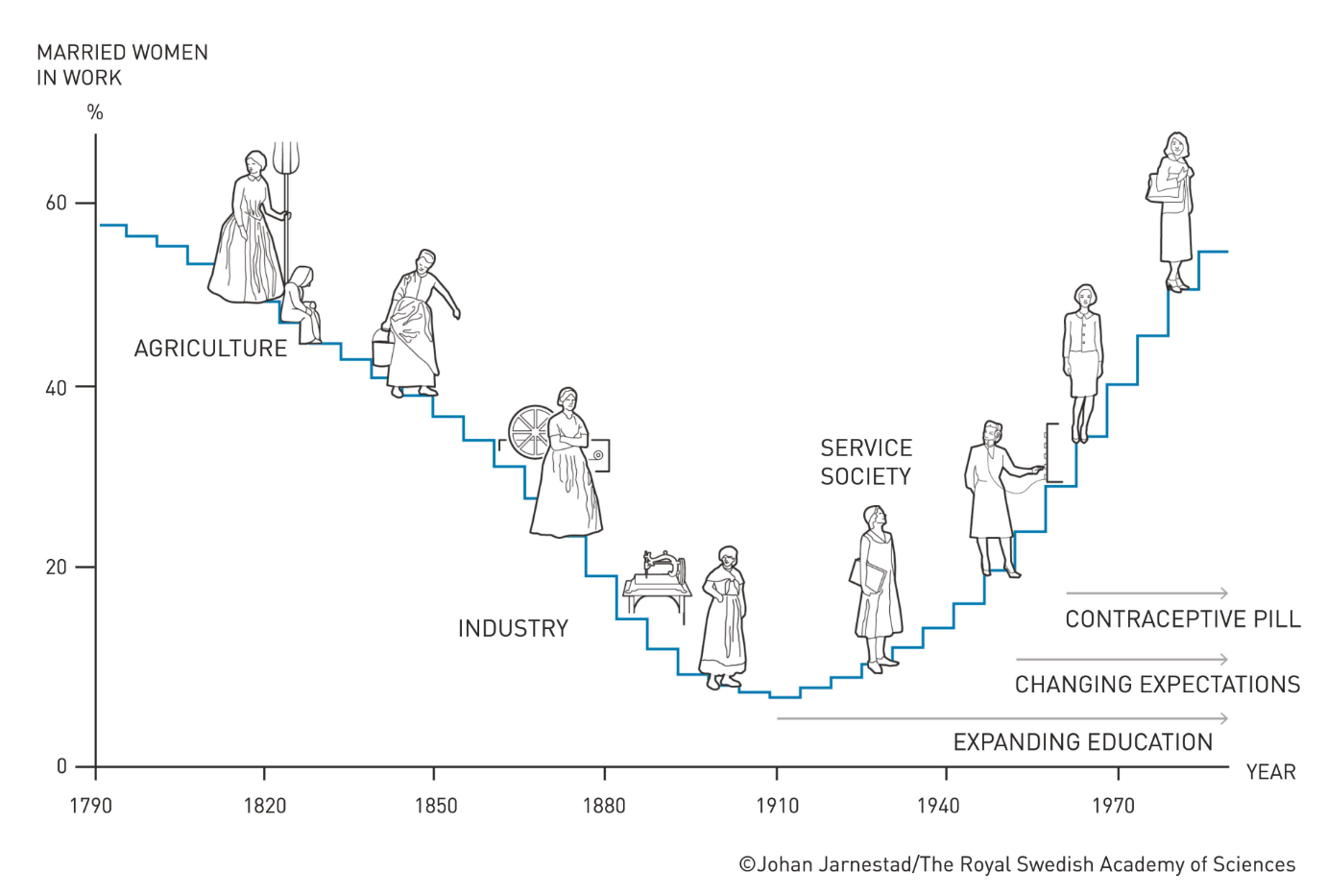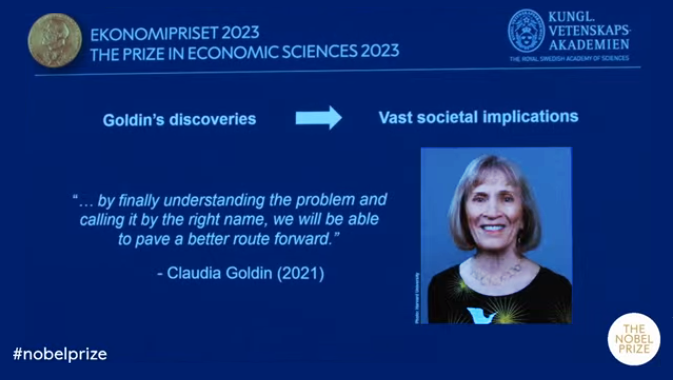News
Economics Nobel Prize Goes to Labor Economist Claudia Goldin
9 October, 2023
This year’s Nobel awards season culminated earlier today in Stockholm with the announcement of the Prize in Economics. The Royal Swedish Academy of Sciences has decided to award the 2023 Sveriges Riksbank Prize in Economic Sciences in Memory of Alfred Nobel to US labor economist Claudia Goldin “for having advanced our understanding of women’s labour market outcomes.”
Goldin, a professor at Harvard University, Cambridge, MA, USA, is only the third woman to have been awarded the prize in economic sciences since the award was first introduced in 1969, after Elinor Ostrom, in 2009, and Esther Duflo, in 2019. A total of 55 prizes in economic sciences have been awarded between 1969-2023, of which 25 have been awarded to one laureate only.
In her research, Goldin describes the problem of the gender gap in earnings and employment rates and how and why they have changed over time. She had collected over 200 years worth of data from the US, allowing her to demonstrate that female participation in the labor market did not have an upward trend over this entire period, but instead forms a U-shaped curve. The participation of married women decreased with the transition from an agrarian to an industrial society in the early nineteenth century, but then started to increase with the growth of the service sector in the early twentieth century. Goldin explained this pattern as the result of structural change and evolving social norms regarding women’s responsibilities for home and family.
Jan Švejnar: “Congratulations to Claudia Goldin on being awarded the Nobel Prize in Economics today. Her research on the labor market participation of women, and in particular her study of the long-term gender pay gap, has been fundamental and has led to the development of this field of economic science. In the Czech context, CERGE-EI/IDEA has published several important studies on this topic. The first, Is women's human capital valued more by markets than by planners? (authors Daniel Münich, Jan Švejnar and Katherine Terrell) was published almost twenty years ago in the international scientific journal Journal of Comparative Economics (https://1url.cz/zupy5). The latest study entitled Czech Women’s Heads and Hands Remain Unused (authors Daniel Münich and Jakub Grossmann) by the think tank IDEA is available at 1url.cz/iupyO.”
Klára Kalíšková from CERGE-EI, herself a labor economist, said the following about this year's laureate: "The Nobel Prize in Economics was awarded to Claudia Goldin, a professor at Harvard University who has devoted her academic career to the study of women in the labor market, the gender gap in earnings, the employment gap between men and women, as well as income inequality, and migration. However, she was awarded the Nobel Prize in Economics primarily for her contribution to understanding the position of women in the labor market. She has often approached the issue from a historical perspective, showing how modern challenges can be viewed through historical experience. She has documented the enormous progress that has been made over the last hundred years in women's access to education, the labor market and the reconciliation of work and family. And she also described areas where, despite all efforts, progress has slowed or stopped in recent years – for example, in equalising wages for men and women."
Economist Štěpán Jurajda from CERGE-EI comments: "Claudia Goldin is the third woman to win the Nobel prize in Economics. She studies women in the work force, the reasons for gender gaps in labor force participation and earnings, across centuries and with the changing structure of the economy. Recently, the improvement of the relative standing of women on the labor market has slowed down, with most of the earnings difference between men and women now in the same jobs, and growing rapidly after the birth of a woman’s first child. This applies even within highly skilled groups of, e.g., business school graduates. This finding resonates in the Czech Republic, where employment and wages of women are dropping dramatically (relative to that of men and childless women) with the birth of the first child. Goldin has attributed much of the gender wage gap to the phenomenon she calls "greedy work", where employers reward disproportionately those workers (typically men) who can work longer and who need little flexibility as to when they work, effectively penalizing women who need to seek flexible labor."
Economist Michal Bauer of CERGE-EI and Charles University Faculty of Social Sciences concludes: "It is great news that this year’s Nobel prize in economics has been awarded to Claudia Goldin, a labor economist and economic historian. Her pioneering research helps us better understand sources of gender differences in employment and wages, which is a fundamental issue for many societies. If women do not have the same opportunity to participate on labor market or they are less rewarded than male for the same work, this can lead to a lot of wasted talent.
Claudia Goldin’s work sheds light on many questions on this topic and one common theme that emerges is the important role of responsibility for home and family in shaping women's education investments and labor market outcomes. Here are some examples: In her early work, she used historical data from the US and showed that when societies industrialized from agriculture, and thus it became more difficult to combine families with work, female labor force participation diminished. In another work, she has documented that technological innovations (namely access to the contraceptive pills in the 1960s) were crucial for female education investments because they allowed women to delay marriage and childbirth. Finally, her research also establishes the so called “motherhood effect”. By monitoring changes in income between men and women over time, she shows that initially, the pay differences between males and females are quite small, but as soon as the first child arrives, the female earnings diminish and never catch up with the earnings of men. This finding has been later shown not only in the US, but also in many other settings, and it suggests that much of the gender wage gaps in high-income countries can be explained by parenthood.
Claudia Goldin’s findings bear important lessons for current policy debates, including those that are taking place in the Czech Republic. For example, they suggest that a more equal allocation of child responsibilities between men and women, or allowing parents to work more flexibly, could go a long a way in helping to close gender wage gaps."
Read more about this year's prize: https://www.nobelprize.org/uploads/2023/10/popular-economicsciencesprize2023.pdf










